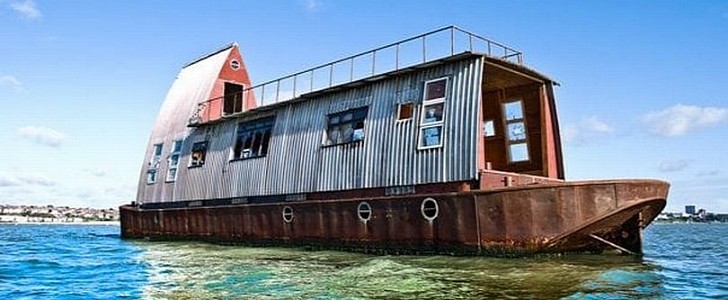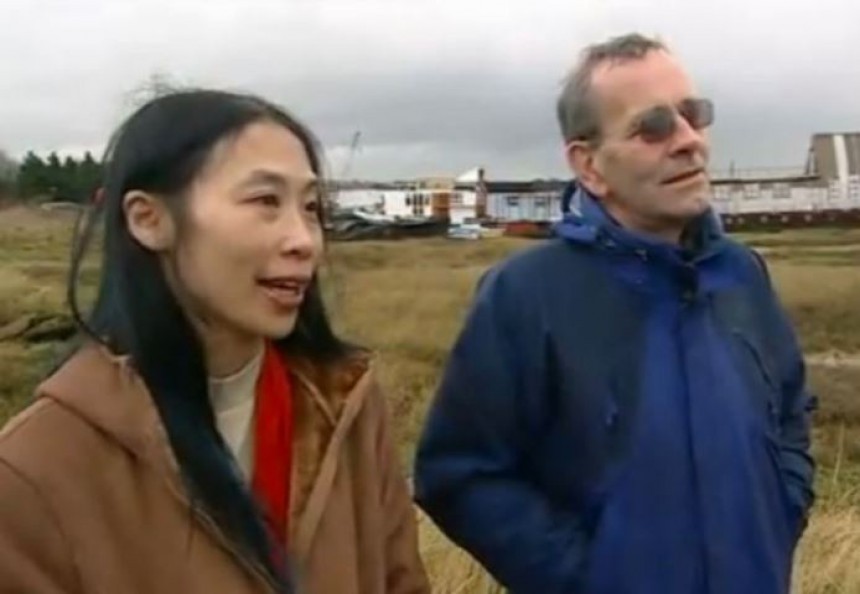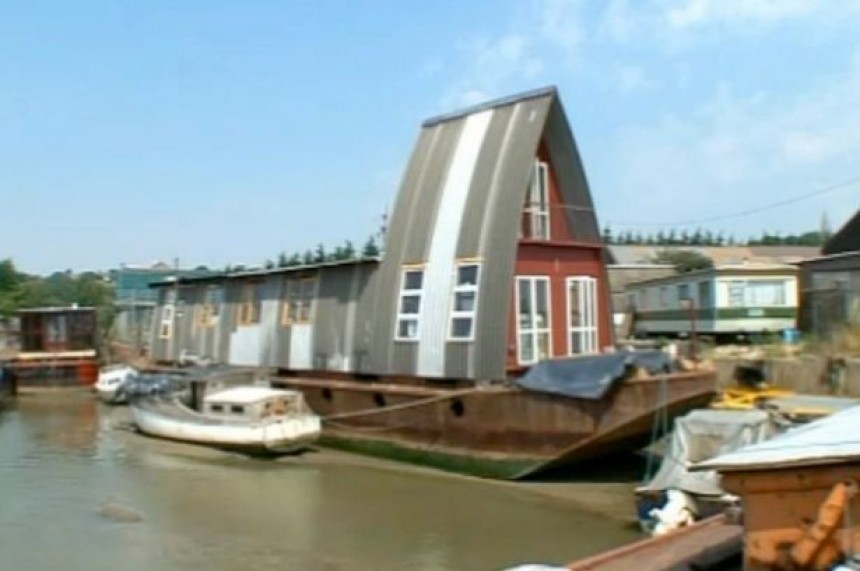This should go without saying, but not everything that glitters is gold. The Medway Eco-Barge, a very famous and controversial houseboat that was, on paper, the ideal project, is a good example of that. It’s also a cautionary tale on how the DIY way doesn’t always work, especially on projects of this size.
In recent years, with increased interest in the more mobile, alternative lifestyle, came a new and very promising monetizing opportunity. People not stuck in a 9-to-5 job in the city and who could work from home, started looking into ways of building “home” on the road, whether that meant on the actual road, or on rivers and lakes. Even better, they could turn their story into cold hard cash, by sharing it online.
The vanlife trend took off, as did its counterpart, with floating homes, and they both had in common the implication that anyone, regardless of skill and budget and even time available, could do a conversion. Anyone could take a beat-up van or an old and rusty barge and turn them into beautiful, fully functional and comfortable mobile homes. Heck, they could even make them eco-friendly and, to a certain extent, self-sufficient, if only they wanted to.
The Medway Eco-Barge begs to differ. If you’re outside of the UK, the name probably doesn’t ring a bell, so let’s just say this: it’s a Kent boathouse that became very famous in 2007, when it was featured on an episode of Grand Design (you can see it in full below). Grand Design is a show that focuses on unique builds, and the Eco-Barge was just that: not because it was a houseboat, but because the owners wanted to build it entirely with repurposed materials and with exactly zero design plans.
The Medway Eco-Barge is the very definition of winging it, packaged as an 86-foot (26.2-meter) steel barge that dreamed of becoming a floating house for a family of four. Today, it’s still a work in progress, and it’s been more than 15 years since Chris Miller and Sze Liu bought it. Chances are it might never become a proper, functional houseboat, and because of this, it’s the perfect cautionary tale, the undercurrent to all those DIY, easy-peasy tutorials you will find online about alternative living.
The story started with the £10,000 ($11,572, at the current exchange rate) steel barge the couple bought. At the time, they’d been living in a 1.5-bedroom apartment in London that they’d long outgrown, but they could not afford to buy a proper, larger home. They’d already lived on a boat before, and owned a narrowboat they occasionally took out, so they came up with the idea of converting a barge into a home.
That’s as far as they ever went in terms of actual planning. The other exception included the vague decision of a superstructure that would be the entrance, because the first deck had to be one continuous open space, so it couldn’t be broken up by a lobby. As Chris explained at the time, this meant the entryway was up a flight of stairs, in a tower-like structure, and you would descend into the living area, and then to the second deck, holding the three bedrooms and one large family bathroom.
Chris never sat down to sketch out his future home; in fact, he resisted the idea bitterly, even when builders kept dropping his project. He also insisted on using only reclaimed materials – other people’s junk, as he put it. On the face of it, this was admirable both because it would keep construction costs down and because it would reduce waste, but in reality, it translated into a complete lack of control over the project. There was no way to predict how long the construction would take, how much it would cost or, for that matter, whether he’d find the right materials. Chris and Sze had taken freeform building to such a length that they only started looking for mooring almost a year into the project.
Some might call this immaturity, but they remained steadfast in their approach. After more than a year and £80,000 ($92,510) later, they still only had half a houseboat, with no electricity, no running water, and no gas. Worse yet, there was still no end in sight, and they still couldn’t own up to the initial mistake in their unique approach.
Despite the positive note on which the Grand Design episode ended (along the lines of “perhaps there is some hope for this project”), it never became a family home: in 2011, the Eco-Barge washed up on a beach in Essex, in terrible condition. A couple of years later, a report said that vandals had caused £70,000 ($81,000) of damages to it, as it had been used for years as a location for parties and raves, and later on, a drug den.
But maybe the fat lady hasn’t sung yet. In the summer of 2021, another couple bought the wreck (it had become just that after years of neglect), and announced plans for a complete renovation. Sarah and Rob Burch told the local media that everything would have to be removed and replaced, from the mismatched windows to the walls of corrugated aluminum that gave it its distinct shape. They said they were ready for the financial challenge and, unlike the previous couple, they had plans.
We haven’t heard of the Eco-Barge since, so here’s to hoping this story may still get its happy ending. Even if Chris and Sze never did.
The vanlife trend took off, as did its counterpart, with floating homes, and they both had in common the implication that anyone, regardless of skill and budget and even time available, could do a conversion. Anyone could take a beat-up van or an old and rusty barge and turn them into beautiful, fully functional and comfortable mobile homes. Heck, they could even make them eco-friendly and, to a certain extent, self-sufficient, if only they wanted to.
The Medway Eco-Barge begs to differ. If you’re outside of the UK, the name probably doesn’t ring a bell, so let’s just say this: it’s a Kent boathouse that became very famous in 2007, when it was featured on an episode of Grand Design (you can see it in full below). Grand Design is a show that focuses on unique builds, and the Eco-Barge was just that: not because it was a houseboat, but because the owners wanted to build it entirely with repurposed materials and with exactly zero design plans.
The story started with the £10,000 ($11,572, at the current exchange rate) steel barge the couple bought. At the time, they’d been living in a 1.5-bedroom apartment in London that they’d long outgrown, but they could not afford to buy a proper, larger home. They’d already lived on a boat before, and owned a narrowboat they occasionally took out, so they came up with the idea of converting a barge into a home.
That’s as far as they ever went in terms of actual planning. The other exception included the vague decision of a superstructure that would be the entrance, because the first deck had to be one continuous open space, so it couldn’t be broken up by a lobby. As Chris explained at the time, this meant the entryway was up a flight of stairs, in a tower-like structure, and you would descend into the living area, and then to the second deck, holding the three bedrooms and one large family bathroom.
Chris never sat down to sketch out his future home; in fact, he resisted the idea bitterly, even when builders kept dropping his project. He also insisted on using only reclaimed materials – other people’s junk, as he put it. On the face of it, this was admirable both because it would keep construction costs down and because it would reduce waste, but in reality, it translated into a complete lack of control over the project. There was no way to predict how long the construction would take, how much it would cost or, for that matter, whether he’d find the right materials. Chris and Sze had taken freeform building to such a length that they only started looking for mooring almost a year into the project.
Despite the positive note on which the Grand Design episode ended (along the lines of “perhaps there is some hope for this project”), it never became a family home: in 2011, the Eco-Barge washed up on a beach in Essex, in terrible condition. A couple of years later, a report said that vandals had caused £70,000 ($81,000) of damages to it, as it had been used for years as a location for parties and raves, and later on, a drug den.
But maybe the fat lady hasn’t sung yet. In the summer of 2021, another couple bought the wreck (it had become just that after years of neglect), and announced plans for a complete renovation. Sarah and Rob Burch told the local media that everything would have to be removed and replaced, from the mismatched windows to the walls of corrugated aluminum that gave it its distinct shape. They said they were ready for the financial challenge and, unlike the previous couple, they had plans.
We haven’t heard of the Eco-Barge since, so here’s to hoping this story may still get its happy ending. Even if Chris and Sze never did.










